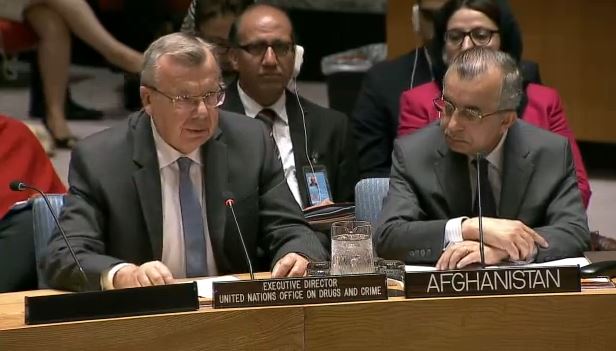21 December 2017
VIENNA/NEW YORK, 21 December 2017 (UN Information Service) — When I addressed this Council on Afghanistan a year ago, I reported that UNODC’s 2016 Afghan opium survey showed a worrying reversal in efforts to counter the drug problem, and highlighted the need to address this destructive threat.
One year later, the situation has become much worse, with our 2017 Afghan opium survey showing unprecedented highs in opium poppy cultivation and production.
Estimated production is up by almost 90 per cent to a record nine thousand metric tons.
The area under opium poppy cultivation has risen to 328,000 hectares. Those are absolute records in the entire history of Afghanistan.

Let us make no mistake: we face a genuine crisis, and our response must be urgent, swift and decisive.
The expected surge in high quality, low-cost heroin poses a number of negative consequences for Afghanistan, its neighbours and the many other transit or destination countries. Increased opiate consumption and related harms may be expected in many parts of the world.
Afghanistan and the international community have struggled for many years to address the formidable challenges posed by drugs and related threats of organized crime, terrorism and corruption.
Recent seizures and analysis show inter-regional links between organized crime and terrorist groups exploiting drugs manufacturing and trafficking.
At the 2016 Brussels Conference, partners of Afghanistan endorsed the reform agenda presented by the Afghan government, and pledged continued political and financial funding to support this country on its path towards stability and development.
Nevertheless, we must recognize that in recent years, attention has progressively shifted away from the threats posed by drugs.
We must reverse this trend, or risk the further expansion and destabilizing influence of non-state actors, organized criminal groups and violent terrorists.
What needs to be done, as priority steps?
First and foremost, comprehensive counter-narcotics programmes which mainstream drugs in national development agendas are essential.
This includes promoting alternative development to create new jobs as well as access to education, financial services and markets faced by farmers and their families.
Second, for effective operational responses to reduce supply, we must focus on all aspects of counter-narcotics capacity building in Afghanistan, including support for:
- intelligence-led investigations;
- controlled delivery;
- eradication programmes;
- dismantling of opium processing labs;
- integrated border management;
- financial intelligence units; and
- law enforcement as well as prosecutorial capacities to disrupt criminal networks.
Third, we need to further strengthen regional and international cooperation to stop precursor chemicals from being diverted and trafficked into Afghanistan to manufacture heroin.
Fourth, we must continue to build the interdiction capacities of key countries along trafficking routes, with an eye to enhancing long-term effectiveness rather than focusing on immediate seizures.
Fifth, we need to intercept illicit financial flows, supporting effective prosecution as well as asset confiscation and recovery.
And finally, prevention and treatment responses must be urgently scaled up, most of all in Afghanistan, which continues to struggle with the health consequences of opiate misuse.
UNODC is working with Afghanistan, neighbouring countries and the wider region to promote the integrated responses needed, in line with the Sustainable Development Goals and the recommendations of the UN General Assembly Special Session on the world drug problem.
We are currently seeking to step up regional and inter-regional action to counter the opium cultivation and production increases, and to respond to related threats of crime, terrorism and corruption.
This includes comprehensive and inclusive support to implement the Afghan National Drug Action Plan, with Afghanistan in the lead.
But we cannot succeed without the engagement and renewed commitment of Member States. The international community cannot afford to do less.
I thank you for your attention to this urgent problem. UNODC stands ready as always to support you.
